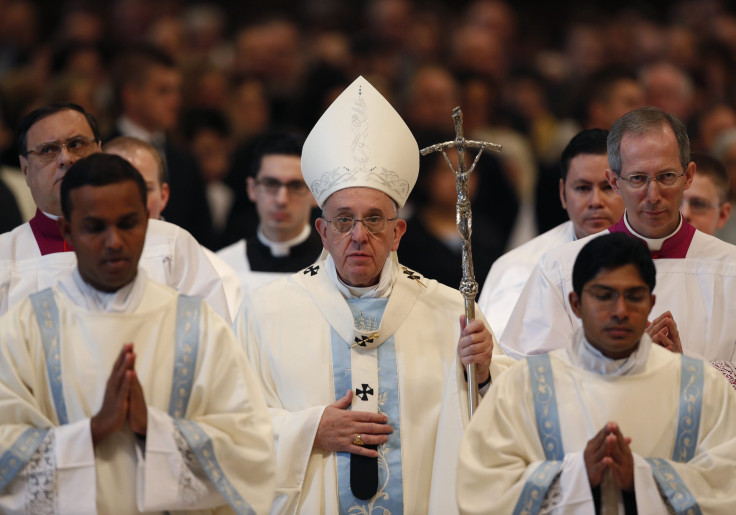Pope Francis' Cardinal Appointments Could Boost Catholic Church's Gains In Africa

Pope Francis’ naming 15 new members Sunday to the College of Cardinals, many of whom hail from developing nations, could help bolster outreach efforts across Africa as the church looks to protect and boost the remarkable membership gains it has made throughout the continent in recent decades. The selection of nine cardinals from the developing world, including Archbishop Berhaneyesus Demerew Souraphiel of Ethiopia and Bishop Arlindo Gomes Furtado of Cape Verde, mark the latest of the reformist pontiff’s efforts to shift the church toward growing Catholic communities and reinforce Francis’ emphasis on addressing poverty in Africa and other regions.
“From a global perspective, this is very important. What the pope is saying [to the church] is ‘go to the peripheries and try to help the most vulnerable communities,’ ” said Patrick Nicholson, a spokesman for the international Catholic social services agency Caritas Internationalis.
African outreach has become increasingly important for the church amid skyrocketing numbers of African Catholics over recent years. Francis’ predecessor, Pope Benedict XVI, paid two visits to the continent during his papacy and, following his abdication, some speculated that an African cardinal might have been in line to succeed him because of Africa’s increasing demographic clout within the church. Roughly 16 percent of the world’s Catholics now live in Africa, where the Catholic population grew almost 21 percent between 2005 and 2010, a rate unmatched by any other region of the world, according to a 2013 study by the Pew Research Center. The Democratic Republic of the Congo had more than a million Catholics in 2010, or the 10th-largest Catholic population in the world.
“Numerically, that's where the church’s center of gravity is now,” said Mark Faulkner, a senior teaching fellow at the University of London's School of Oriental and African Studies who specializes in religion. As a result, it is in the church’s interest to increasingly emphasize its African outreach. “They are going to play to their strengths,” he said.
The church’s robust social service operations across the continent are a major reason it has been so successful in attracting members. The church is “the biggest single development agency on the continent,” said Paul Gifford, a religion professor at the University of London's SOAS. The church “has extended its service provision to cover almost everything imaginable, including rehabilitation of the justice system, strengthening food production, microfinance, nutrition outreach programs, human rights, women’s health, child mortality, water sanitation, HIV and AIDS education, conflict resolution, etc.,” he said in an email to International Business Times. “No other body can match its involvement."
Still, the Catholic Church remains vulnerable on the continent as other forms of Christianity, including the Pentecostal movement, vie to meet the spiritual needs of Africans. “The specifically ‘religious’ needs experienced by so many Africans (detecting of spirits, identification of witches, casting out of demons thought to be blocking a Christian’s victory) are largely ignored by the Catholic Church,” said Gifford. “Hence the appeal of Pentecostalism, many of whose churches meet exactly these needs.” A 2006 Pew survey reported that 12 percent of Africa’s population, or about 107 million people, were followers of Pentecostalism, one of the fastest-growing segments of global Christianity.
The pastoral bent of Francis’ cardinal appointments show that he is hoping to address that issue and shift the church from being mainly a “service provider” to instead help “re-engage with the fundamental spiritual needs of the people being served,” Faulkner said, and show that the “church is not just about care and development but also about spiritual development.”
Another challenge for the church on the continent is in how it addresses the HIV/AIDS epidemic, an issue that has caused controversy for previous popes. Sub-Saharan Africa is the region of the world most affected by the epidemic, with an estimated 24.7 million people living with HIV in 2013, or 71 percent of all people living with HIV in the world, according to the World Health Organization. Pope Benedict described the epidemic as primarily an “ethical problem” during his 2011 visit to Africa. His insistence that the use of condoms would “increase” the problem caused a global outcry, according to the Atlantic.
Francis has taken a softer tone toward the issue, praising "all who strive diligently to educate people in the area of sexual responsibility and chastity,” according to the Associated Press. However, the pontiff has not changed the church’s stance against the use of contraceptives, an issue that remains troubling to aid workers and others. Some of the most prominent critics of the church’s current stance are African church leaders, including Bishop Kevin Dowling of South Africa, who has been outspoken in his support for condom use to help fight the AIDS crisis, according to the AP.
Despite this, the church has been able to attract new followers across Africa. “There is a great difference between what is proclaimed from the rooftops and what is whispered in the confessional,” said Faulkner. “In the pastoral setting, there is much more sensitivity.”
© Copyright IBTimes 2024. All rights reserved.






















